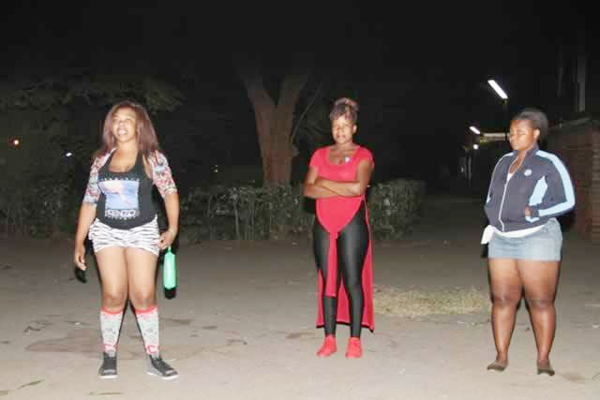

social commentary with Moses Mugugunyeki
At the age of 15, Tendai Dube* was heavily into drugs, dodging school and creating havoc among her peers along Ndema Road in Gweru’s Ascot suburb where she stayed with her single mother. However, she could not stand the pressure from her neighbourhood and ran away from home.
While on the streets, Dube found herself engaged in a desperate battle for survival, and the most viable option was to sell her body.
“It was difficult at first, but I had no other option. I joined a group of young sex workers who were roaming the streets of Gweru at night. I needed to survive and sex work was the only option,” Dube said.
“I would travel as far as Hwange, Beitbridge or Nyamapanda with truck drivers and I was doing all this at the age of 15. I now have five years in the trade, but I am doing business differently,” she said.
Dube, who prefers calling herself “My Maka”, is among a group of sex workers aged between 15 and 24 years benefiting from the Centre for Sexual Health and HIV and Aids Research in Zimbabwe (CeSHHAR), an Aids-based organisation that works together with the National Aids Council to empower sex workers to improve their sexual and reproductive health in Gweru.
The organisation has come up with a cocktail of strategies, including community empowerment approaches with the aim of reducing the risk of acquiring HIV among young sex workers.
- Chamisa under fire over US$120K donation
- Mavhunga puts DeMbare into Chibuku quarterfinals
- Pension funds bet on Cabora Bassa oilfields
- Councils defy govt fire tender directive
Keep Reading
In Zimbabwe, sex workers face criminalisation, violence, discrimination and other forms of human rights violations, which increase their risk of acquiring HIV.
“Sex work is stigmatised and we are discriminated in that society shuns us. It was difficult for me to access health services at our local clinic in Mtapa just because I am a sex worker,” Dube said.
“The coming in of CeSHHAR has helped us a lot as we now access health services from their mobile clinic.”
According to UNAIDS, HIV prevalence among sex workers is 10 times higher than among the general population, and sex workers are poorly served by HIV services. It is against this backdrop that CeSHHAR has mobilised young sex workers in Gweru and surrounding communities for community empowerment services that are aimed at reducing violence, stigma and discrimination, including sensitisation training.
Part of the programme includes enlisting peer educators to assist in the distribution of condoms, information on sexually-transmitted infections and HIV prevention, paralegal services and health service referrals.
A recent visit to a CeSHHAR project at GWAPA Farm in Gweru by a team of journalists showed that the organisation has gone a gear up through improving sex workers’ access to economic resources.
“We have among our projects the economic strengthening training which is ongoing for a group of sex workers here in Gweru,” said CeSHHAR outreach worker Sekai Dembaremba.
“We have a group of 30 sex workers aged between 15 and 24 years who are part of the training. The training is meant to impart in the sex workers the financial, marketing and business skills necessary to help their businesses grow.”
Dembaremba said one of their components meant to reduce HIV infections among adolescent girls and young women was the DREAMS project.
“The project aims to help girls develop into Determined, Resilient, Empowered, Aids-free, Mentored, and Safe (DREAMS) women. Part of the training includes adolescent sexual reproductive health education and HIV prevention,” she said.
Dube is among beneficiaries of the DREAMS project.
“I am now back at home and I am writing my O’ Level, thanks to the DREAMS project which is financing my education,” Dube said.
NAC Gweru district co-ordinator Murari Hwingwiri said the economic strengthening training was one of the many approaches that seek to help sex workers confront their economic vulnerability.
“The project is aimed at empowering these girls economically to address their vulnerabilities on economic factors. Studies from other countries show that this is one approach that tries to address the economic vulnerability that puts sex workers at increased risk of acquiring HIV,” Hwingwiri said. Hwingwiri said more than 3 500 sex workers in Gweru were accessing health services from the CeSHHAR clinic.
“Sex workers usually complain that they are discriminated against at health institutions, hence, through CeSHHAR, health and other issues affecting them can be dealt with through their own platform,” he said.
Services offered at the clinic include free STI treatment, HIV testing, family planning, mobilisation for prep and art, condoms both male and female, and legal advice through partnerships with Zimbabwe Lawyers for Human Rights.
Sex workers have been identified as a key population in the global fight against Aids.
Dube said if she passes her O’ Level, she would like to proceed to A’ Level and later university. “I hope to help my mother and child if I get a job. Now I can dream,” she said.











